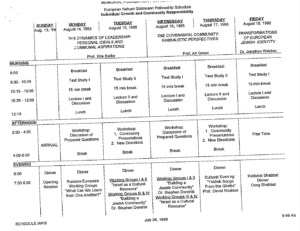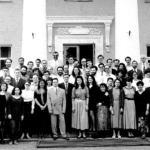FELLOWSHIP ARCHIVE
NGF 5 - Zvenigorod, Russia | August 13 - 24, 1995
Continuing the MFJC’s commitment to supporting Jewish life in the FSU, the fifth NGF returned to Zvenigorod, outside of Moscow, with 60 Fellows from 23 countries across the Former Soviet Union, Europe, and Latin America.
program
The theme of this NGF was Individual Growth and Community Responsibility and included sessions on:
The Dynamics of Leadership: Personal Ideals and Communal Aspirations
The Covenantal Community: Kabbalistic Perspectives
Transformations of European Jewish Identity
After the Apocalypse: Responses to the Shoah in Jewish Culture
Additional small group sessions addressed the topics of building Jewish communities and using Israel as a shared cultural resource.

faculty
Fellows were joined by a distinguished faculty from around the Jewish world:
Professor Ella Belfer, Department of Political Studies, Bar-Ilan University, Ramat Gan, Israel
Dr. Stephen Donshik, UJA Federation Israel Office, New York, NY, USA
Maurice Friedberg, Department of Slavic Languages & Literature, University of Illinois, Urbana-Champaign, IL, USA
Professor Art Green, Philip W. Lown Professor of Jewish Thought, Brandeis University, Waltham, MA, USA
Frima Gurfinkel, Michlalah College, Jerusalem, Israel
Professor Jean Halpérin, Professor of Jewish Thought, University of Fribourg, Fribourg, Switzerland
Professor R. M. Kaplanov, Department of Jewish Studies, Moscow State University, Moscow, Russia
Professor Samuel Kassow, Charles H. Northam Professor of History, Trinity College, Hartford, CT, USA
Mikhail Krutikov, Gorky Institute of Literature, Moscow, Russia
Professor David Roskies, Jewish Theological Seminary of America, New York, NY, USA
Dr. Jonathan Webber, Universitat Bielefeld, Bielefeld, Germany
more about the fellowship
Unique to this program was the inclusion of sessions for Eastern European and Russian Fellows addressing Transformations in Jewish Identity; The Jewish Self-Image in Russian Literature; and Personal Ideals in Leadership: Biblical Models. Fellows from these communities also participated in meaningful conversations about reaching Jews who remained unconnected to the community and had the opportunity to consider their individual and communal futures in a shared space.
The fifth NGF successfully continued the MFJC’s work of strengthening and supporting Jewish communal life in the former Soviet Union through the creation of relationships with neighboring communities and with the global Jewish world.
The program bridged connections between Jews from all backgrounds and practices towards a common goal: to strengthen and create thriving Jewish communities globally.

